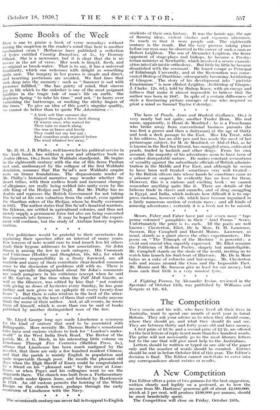The seventeenth ceriurYean never fail in itsappeal to En g lish •
students of their own history. It was the heroic age, the age of flaming ideas, violent clashes and vigorous utterance. So much so that it wore people out. The eighteenth century is the result. But the very process taking place before our eyes may be observed in the career of such a man as Robert Leighton. The son of Alexander Leighton, the fierce opponent of stage-plays and bishops, he became a Presby- terian minister at Newbattle, which involved a severe examin- ation into Calvinistic orthodoxy. But little by little he became dissatisfied with the covenant. He found escape as Principal of Edinburgh University, and at the Restoration was conse- crated Bishop of Dunblanc, subsequently becoming Archbishop of Glasgow. The story of his development into " pietistic Erastianism " is now (Robert Leighton, Archbishop of Glasgow, J. Clarke. 12s. 6d.), told by Bishop Knox, with an energy and fullness that make it almost impossible to believe that the author was born in 1847. In spite of a certain diffuseness of style a fascinating picture emerges of one who inspired so great a mind as Samuel Taylor Coleridge.
* * * *
























































 Previous page
Previous page